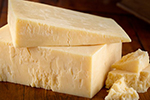Dairy Industry Blasts Market Barriers in EU-Canada Trade Deal
October 7, 2014
 The recent release of the official text of the free trade agreement between the European Union and Canada has triggered dairy industry charges that the authors are attempting to further restrict U.S. access to the Canadian cheese market.
The recent release of the official text of the free trade agreement between the European Union and Canada has triggered dairy industry charges that the authors are attempting to further restrict U.S. access to the Canadian cheese market.
Dairy trade groups including NMPF, the International Dairy Foods Association and the U.S. Dairy Export Council said the text includes objectionable provisions on geographical indications, and reallocates some of Canada’s import quota for cheese from the United States and other countries to the EU.
The geographical indications provisions are particularly alarming, the groups said, because they grant the EU automatic protection for five commonly used cheese names in violation of both international trade commitments and Canadian intellectual property law.
The cheese names are asiago, feta, fontina, gorgonzola and munster. Under the agreement, manufacturers that produced these cheeses before last October can continue to use the generic names, but others will be required to use qualifiers, such as asiago-type, feta-style or imitation munster cheese.
Jaime Castaneda, senior vice president of both NMPF and the U.S. Dairy Export Council, said Canada added insult to injury by both watering down the already-limited access of U.S. exporters to the Canadian cheese market and by restricting access U.S. exporters expect to gain through a separate Trans-Pacific free trade agreement.
“This is yet another example of Canada’s work at every turn to limit access to its market for highly competitive U.S. products,” Castaneda said.
The text of the agreement, known as the Comprehensive Economic and Trade Agreement, or CETA, still must be ratified. An implementation date is not known.






